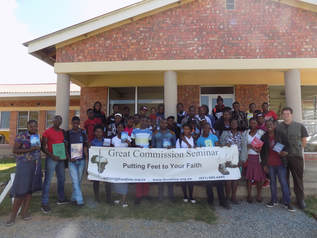 “The kingdomsof this world have become the Kingdoms of our Lord and of His Christ, and He shall reign forever and ever!” Revelation 11:15 Geography Swaziland was isolated for many years from any contact with western civilization due to its geography. It lies nearly 1,600km (1,000 miles) from the coast of the Cape of Good Hope, and inland beyond a shield of mountains called the Lubombo Range. It is bordered by Mozambique to its north-east and South Africa to its north, west and south. It is a small country, with a surface area of 17,364 km2 and a population of about one million people. Political Control The Kingdom of Swaziland was established in the early-18th century. The present boundaries were drawn up in 1881.After the Anglo-Boer War, Swaziland was a British protectorate until 1967. It gained its independence in 1968. Whilst Swaziland is generally quiet and peaceful, due to it being a country with only one ethno-linguistic group, student and labour protests in the 1990’s pressured the king to introduce reforms. Today King Mswati III is Africa's last absolute monarch in the sense that he has the power to choose the prime minister, other top government posts and top traditional posts. In 2004, Mswati promulgated a new constitution that allows freedom of speech and assembly for the media and public, while retaining the traditional Tinkhundla(constituency) system. The king is deeply respected by the people, although he has been criticized by some for his lavish lifestyle. Religion Mswati is apparently very positive towards Christianity, even holding his own Easter Conferences at which he preaches! Also, about two weeks before we arrived in Swaziland, he had passed a law stating that Christianity is the only religion that may be taught in schools. The Gospel is preached openly in schools, prisons and on national radio. Whilst these are positive moves, Swaziland is still steeped in Animism, such as animal sacrifices to appease the ancestors. Polygamy is common, with King Mswati himself having 13 wives. Missions History Sometime in the mid-1830’s, King Sobhuza I heard that many of the great chiefs of neighbouring territories had Christian missionaries residing and working among them and it is reported that being spurred by a dream, in 1838 he sent a delegation to Basutoland to seek a missionary who would come to live in his royal household and give his son Mswati an education. The following is an extensive quotation from 150 Years of Mission Churches in Swaziland, 1844 -1994, by Marjorie Froise, Master of Theology thesis, UNISA, 1996: King Sobhuzal's dream and the requests to Wesleyan Missionaries King Sobhuza’s dream played a significant role in the history of Missions in Swaziland. Sobhuza saw men carrying round pieces of metal (probably coins) and a scroll. In his dream, he was told to choose the scroll. Before his death in 1839, Sobhuza is recorded as having addressed his counsellors, "Seek a white man (teacher) for my son; he will preserve him and the nation" (Jones, 1993, p.182). Several delegations were eventually sent, but it was not until after the death of Sobhuza, that the call was responded to by Wesleyan Missionaries, James Allison and Richard Giddy. This dream of Sobhuza held a further message for the Swazi people. To Sobhuza, it was a warning from the ancestors never to fight the white people and this played a role in Swazi relationships with Europeans through the years (Scutt, 1966, p.18). First Missionaries to the Swazi James Allison, the son of 1820 settlers in South Africa, became a teacher, then lay-preacher and later a pioneer missionary in the Wesleyan Church. Allison, accompanied by Richard Giddy and Sotho evangelists responded to SobhuzaI's call and arrived in Swaziland in June 1844. They were met and escorted to the residence of the regent who had oversight of the country until Mswati II, Sobhuza’s young son, was old enough to take control. The welcome was warm. The speeches that were made gave some indication of the expectations of the people. Allison's diary, records the speech made by the Queen Mother: "The teachers have at length arrived in the midst of us. Our enemies have long oppressed us. The teachers are our only hope. Through them we may be preserved from destruction." First Fruit The king may have been looking for more than education or religious instruction, but rather that the missionaries would act as a buffer between them and their enemies, particularly the Zulus. They were allotted land in the south and the position of the site given to the mission, strategically placed between the royal court and a troublesome Zulu tribe. In their enthusiasm to present the Gospel message Allison and Giddy may not have fully understood this implication. They stayed long enough to build a house and chapel and plant fruit trees before returning south. They left two Sotho evangelists, Job Nkambule and Barnabus Mthembu to commence the work in Swaziland. Rapid Growth Allison and Giddy returned to their mission station and Allison made formal representation to his Mission to consider commencing a work in Swaziland. While awaiting his Mission's response he began learning Siswati and translated the First Catechism with the assistance of two Swazi men who had accompanied him home. A year later, in July 1845, Allison returned to Swaziland with a party of thirty.He developed the base at Mahamba, the site allocated him by the royal household.Mission stations were established in new areas and the teachers, who had accompaniedAllison, began the task of establishing the new ministries. The work advanced rapidly. Swazi’s Turn to Christ Allison's congregation at Mahamba grew to between five and six hundred, including those from surrounding villages. Requests were received from chiefs across the country for teachers to be sent to them. The records of achievement over the two years of Wesleyan work in Swaziland showed remarkable growth. Four chapels and six preaching stations were established, recording twenty-six accredited church members and a further forty-one on-trial members. Allison, together with ten catechists, was planting churches and ministering to the people. During the second year of ministry in Swaziland an estimated 12,000 attended church services. Trouble brewing This period of rapid expansion and growth in the church was taking place at a politically turbulent time. Mswati II, the newly installed young king, turned against Malambule, who fled before him to take refuge at Allison's mission station. Allison refused to take sides and attempted in vain to mediate. A force of about 1,200 of Mswati's warriors, supported by Ohrigstad (Lydenburg) Boer Commandos, arrived at the Mission station during a Sunday morning service attended by some 700 - 800 people. A carnage took place leaving between fifty and sixty people dead, including women and children. Mswati demanded the surrender of the wounded, all the women and children and also a woman who had stated that 'God was greater than Mswati'. It was clearly believed by Mswati and his councillors that Allison had interfered in internal politics and this incident was referred to many times in years to come as the church sought to advance. The Exodus Allison surveyed the damage caused by this incident. The area around the main Mahamba mission station was depopulated for thirty miles, while an outstation was burnt to the ground, killing twelve people who had taken refuge. On the 17 September 1846, Allison reached a decision to move to Zulu territory and, together with about 1,000 people, he arrived at one of the outstations. Two months later Allison reached Pietermaritzburg accompanied by about 200 people. A Closed Door for Christian Witness The door to any religious activity was effectively closed with the withdrawal of Allison and his party. Mswati perceived the missionaries had meddled in politics, but he also resented the fact that Allison had fled with his subjects. Furthermore, the missionaries had created a Christian counter-culture that challenged and undermined Mswati's supremacy and the existing social structure. Allegiance was being paid to the missionaries and Christian teachers rather than Mswati. His indiscriminate killing was challenged, and traditions such as polygamy, levirate marriages, and dress codes were opposed. Missionaries Return It was only after the accession of the new king, Mbandzeni, in 1875 that Missions were allowed to commence ministries in Swaziland. From then onwards, the Wesleyans returned (including Daniel Msimang, one of the Swazis who had fled with Allison to Natal as a boy). Missionaries from the Berlin Mission Society began work there and also Anglicans established churches throughout the nation. 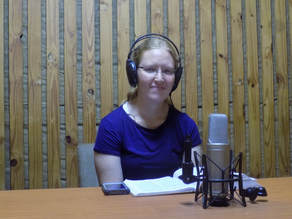 Ministry in Swaziland - Radio Recordings Driving through the town of Manzini, we noticed that there was a radio recording studio at the Christian Media Centre. They gave us the opportunity to record fourteen 5 minute devotionals, seven of which will be aired as prologues (which open the broadcasts for the day) and the other seven as epilogues (these end the broadcasts for the day). These will hopefully be aired on the one of the national radio channels. In the prologues we worked through the Seven C’s of History and in the epilogues we worked through Reformation 500 and its Relevance for Us Today and the Five Solas of the Reformation. Highest HIV Prevalence in the World Swaziland officially has the highest prevalence of HIV/AIDS (in terms of the percentage of the population of their country) of any country in the whole world. Some of the reasons that have been suggested for high HIV statistics throughout Southern Africa are: polygamy undermines the Christian principle of the sanctity of marriage; urbanisation has destroyed much of the traditional, cultural restrictions on sexual immorality (e.g. virginity testing); the flood of immoral media from the West; and poverty combined with the strong pull of materialism has led to what is sometimes called the ‘sugar daddy’ syndrome, where women may have several boyfriends who give them money (for e.g. airtime) in exchange for sexual favours. Add to these practical factors the fact that Christians have preached a watered-down Gospel and have failed to disciple their congregations in a comprehensive Biblical Worldview and you have a recipe for rampant sexual immorality. Teaching at Orphan Student Centres There are roughly 100,000 orphans in Swaziland, with the vast majority of them having lost their parents to HIV/AIDS. Our only initial contact in Swaziland was the Founder and Director of the Swazi Orphan Teaching Foundation. He invited us to teach for two days at two of these centres. The Swazi Orphan Foundation has five student centres across Swaziland to which children who cannot afford school fees, or who have dropped out of school for various reasons (e.g. pregnancy), can receive some educational input from volunteer teachers. We conducted two days of teaching at two centres. Topics included: The Seven C’s of History, The Gospel, The Greatest Man Whoever Lived and How to Study the Bible. Each student received a Gospel of John and Romans booklet and several other Gospel or Bible teaching leaflets produced by Frontline Fellowship. We donated English Bibles, books and audio-visual materials to each centre’s library. Swazivision We met a Dutch missionary at the KwaSizabantu Ministers Conference, who is the founder of Swazivision. Swazivision arranged for 15 Swazi pastors to attend the Ministers Conference. The pastors said they were deeply challenged by their visit to the Mission and one of them commented: “We have never seen anything like this before!” This missionary graciously allowed us to stay in his guesthouse during our time in Swaziland and arranged for Abrie to preach at the Sunday Service of the congregation he is a member of in Big Bend. In addition to their prison and AIDS orphans’ ministry, Swazivision convenes Leadership Conferences for pastors, managers in the tourism industry and other leaders in society. We donated a box of Bibles and other Gospel literature to them for their work. KwaSizabantu Schulzendal’s Ministers Conferences for Siswati Pastors The KwaSizabantu Mission station near Malelane and close to the Jeppe’s Reef border of Swaziland, annually holds Ministers’ Conferences, with many pastors from Swaziland attending. They also arranged for 25 pastors from Swaziland to attend the Ministers Conference in KwaZulu Natal this year, 6-8 March. Frontline Fellowship has previously donated Bibles and books for pastors attending these Ministers’ Conferences. Co-workers of KwaSizabantu Schulzendal minister regularly in Swaziland. King Mswati has even requested a meeting with them and has offered them land to build a Mission station in Swaziland. Future Leadership Training in Swaziland God willing, in co-operation with Swazivision and KwaSizabantu Mission, we plan to organise a pastors’ conference in Swaziland later this year, where we can train pastors in Biblical Evangelism and Expository Preaching. Pray for Swaziland Pray that pastors would boldly preach against sexual immorality and call people to repentance and Faith in Christ. Pray that they would teach on Biblical purity and principles for strong marriages, so that the scourge of HIV/AIDS in Swaziland could be eradicated. Pray that bondage to ancestral spirits would be broken. Pray that the Kingdom of God would come in the hearts and minds of the Siswati people in such a way that it would flow out from their hearts to transform the Kingdom of Swaziland, to the Glory of God. “Therefore God also has highly exalted Him and given Him the Name which is above every name, that at the Name of Jesus every knee should bow, of those in Heaven, and of those on earth, and of those under the earth and that every tongue should confess that Jesus Christ is Lord, to the glory of God the Father.” Philippians 2:9-11 Abrie and Taryn Lourens Frontline Fellowship P.O. Box 74 Newlands 7725 Cape Town South Africa Tel: 021-689-4480 Email: [email protected]
0 Comments
Leave a Reply. |
More Articles
All
Archives
June 2024
|
"And Jesus came and spoke to them, saying, “All authority has been given to Me in heaven and on earth.
Go therefore and make disciples of all the nations, baptizing them in the name of the Father and of the Son and of the Holy Spirit,
teaching them to observe all things that I have commanded you; and lo, I am with you always, even to the end of the age.” Amen.” Matthew 28: 18-20
Go therefore and make disciples of all the nations, baptizing them in the name of the Father and of the Son and of the Holy Spirit,
teaching them to observe all things that I have commanded you; and lo, I am with you always, even to the end of the age.” Amen.” Matthew 28: 18-20
|
P.O.Box 74 Newlands 7725
Cape Town South Africa |
|
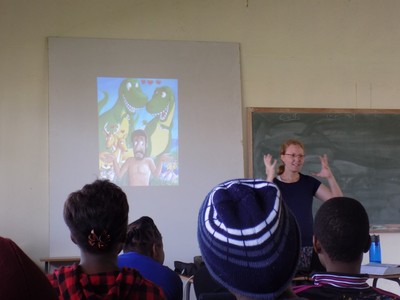
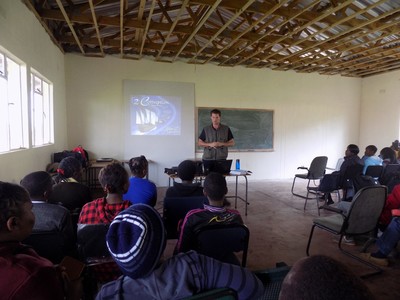
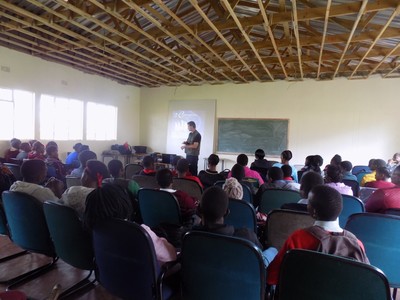
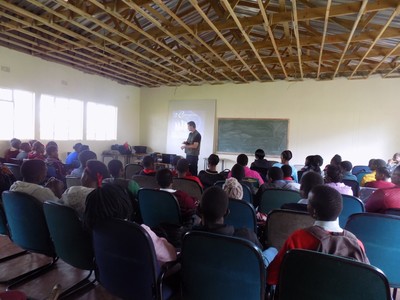
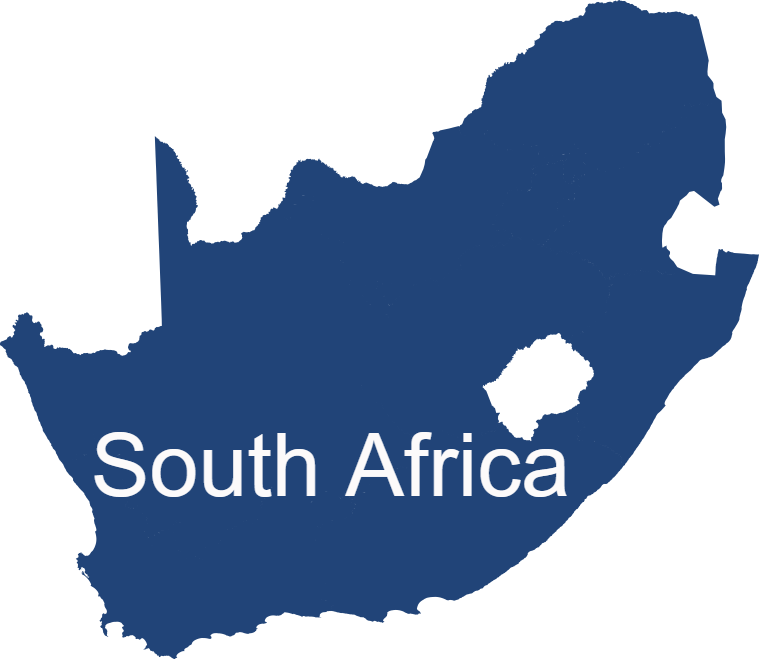
 RSS Feed
RSS Feed
